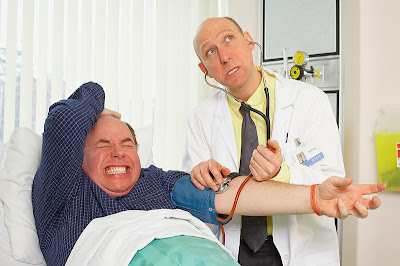Low blood pressure symptoms - if you are concerned?
Blood pressure is the result of the passage of time
the blood resistance in the blood that the heart pumps blood vessels. Every
time your heart beats, it pumps blood into the arteries. When the heart is actively
pumping blood, the pressure is at its highest and returned to the systolic
pressure. Between beats, when your heart is at rest, the
pressure drops
it is the diastolic pressure. These two numbers determine your blood
pressure and are usually written one above / or before the other, for
example 120/80 or 120 spoke on 80 (normal). A reading of 90/60 or less is
considered low (hypotension), while 140/90 is considered high (hypertension).
A diagram of the blood pressure when used in tandem with your blood pressure
monitor can be a valuable tool to ease your worries or fears.
Low blood pressure can not be gained notoriety as
high, but if it is not dealt with its consequences can be equally serious.
There are a variety of ailments linked to the low pressure if it is not
diagnosed and treated in its early stages can lead to serious complications.
The most important are: postural (orthostatic) hypotension and neutral
mediation (neurogenic orthostatic) hypotension.
Orthostatic hypotension is manifested as dizziness or
lightheadedness when moving from a lying or sitting to standing position. It is
thought to be caused by the inability of the autonomic nervous system (that
part of the nervous system that controls involuntary vital actions such as
beating of the heart) to respond appropriately to sudden changes. It is
believed that this can happen for a variety of reasons, including: lack of
food, prolonged exposure to heat, or being too tired. People taking medications
for high blood pressure are also prone to this disease. Treatment
depends on the severity of symptoms and may include increased fluid and salt
intake and avoid prolonged periods without food or drink. Drugs that promotes
the retention of sodium and absorption may also be prescribed.
Neutral mediation Hypotension
when the regulation
of blood pressure in the body is affected, especially when standing. It
is considered a lack of communication between the brain and the nervous censors
to control heart rate and blood pressure. No, it's always serious illness,
in some cases, it may just be temporary while in others it may result in a
person being unable to stand for long periods, dizziness, blurred vision and
fainting close .
The kidneys can balance the pressure naturally low
retaining salt and water, which eliminates the need for medical intervention.
However, it is advisable that you talk to your doctor if your monitor records
consistent low readings or if you experience any of the symptoms mentioned. For
some people, a reading below 120/80 is normal and no cause for alarm. This
reading or low limit is normal and can even be considered a sign of good
cardiovascular health, as this can also be an indication of some stress on the
heart, lungs and blood vessels. A pressure drop may be due to an event
(eg up too quickly) or because of a medical condition. However, low blood
pressure can not always be ignored. If you experience frequent episodes of
dizziness, fainting, blurred vision, nausea, rapid weak pulse, muscle weakness,
fatigue, headache, cold and clammy skin and lack of concentration, you should
consult your doctor for evaluation, diagnosis and treatment, if necessary. In
extreme cases, the body may be deprived of sufficient oxygen, which can result
in impaired heart and brain function and respiratory problems leading to loss
of consciousness or shock.












0 comments:
Post a Comment